Featured by Twinkl in the World Art Day Blog
Looking for easy art activities for preschoolers to do at home or at school?
The best way to get young children learning while doing art is to let them experiment with art materials and tools freely.
A search for ‘art activities for preschoolers’ on Pinterest or Google will yield thousands upon thousands of results of gorgeous-looking, fancy arts and crafts projects.
This is not that kind of article. I’d like to give you some ideas for simple, everyday, real art activities—the kind your kids will truly learn from and the kind that don’t always look fancy.
Why Is Creative Art Important For Preschoolers?
Art is beneficial for children’s development in many ways:
- It builds fine motor skills.
- It develops pencil grip and pre-writing skills.
- It teaches children how to plan on paper.
- Art develops visual perception.
- It helps children to express ideas and concepts.
- The process of doing creative art strengthens kids’ attention spans.
- Art often involves problem solving.
Read more about the benefits of art for children.
15 Creative Art Activities For Preschoolers
Here are some really basic and easy creative art ideas for kids that you can do at home or school, with little prep. There’s also a printable of these activities at the end of this post.
Some are completely child led and some require you to guide slightly, but all are great open-ended art activities for preschoolers that will encourage creativity.
These arts and crafts ideas are perfect for preschool-aged children, as well as those in kindergarten, reception year, and beyond.
Change them to suit you, interpret them your own way or use different materials and tools.
1. Straw Painting
Straw painting can be done by splattering paint or blowing paint. Simply pick up some paint in a straw and splatter it onto the paper or put a drop of paint onto the paper and blow through the straw to make the paint spread out.
Either way, the effect is quite cool.
2. Finger Painting
Finger paint can be bought or made at home with simple ingredients. Here are some finger paint recipes to try (some are edible).
Offer your children large pieces of paper and let them go wild with the paint, with no directions. This is a great tactile experience and will work those finger muscles.
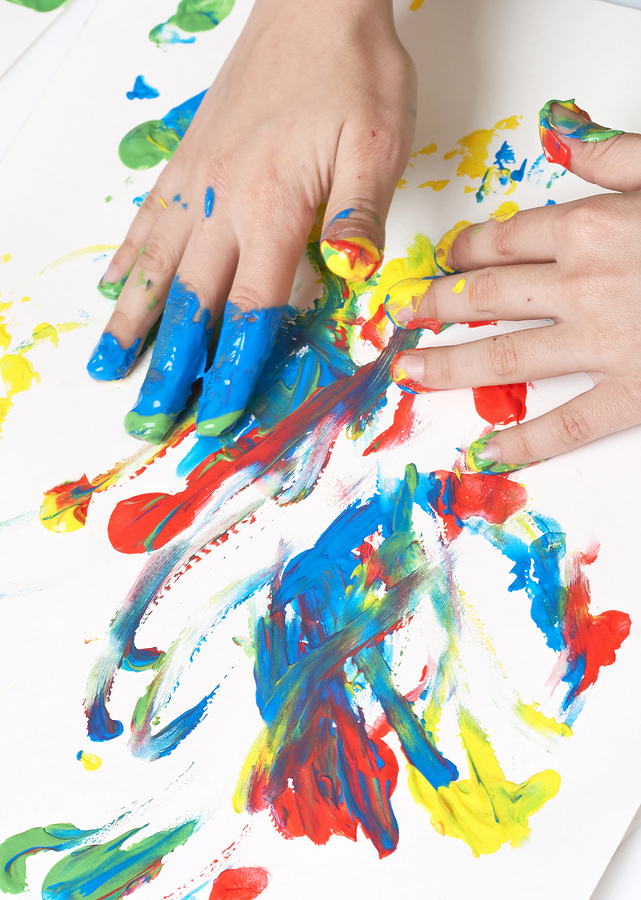
3. Colour Collage
Offer magazines and sheets of white paper and ask your kids to make a colour collage with only one specific colour. They can cover their whole page by cutting out or tearing bits of paper that they find in the magazine.
Tearing and cutting are both important skills that some children struggle to master and therefore require lots of practice.
4. Leaf Printing
Choose a variety of leaves of different shapes from the park or garden. Paint the leaves with a large paintbrush and then print them onto white paper.
It takes a lot of coordination to hold the leaves and carefully turn them over to print them. Again, let your children decide how many leaves to use, what colours to use, and how to print them.
Remember to chat about the pattern that the veins of the leaves create.
5. Potato Printing
Potato printing is one of my favourites. If you have some potatoes that are starting to get soft, cut them in half and cut some simple patterns into them or leave them in their natural oval shape.
Then, dip the potatoes in a tray of paint and print them onto paper. Easy peasy.

6. Box Construction
When I taught preschool, I had a large laundry basket in my class filled with toilet rolls, cereal boxes, used tin foil and other waste materials from the children’s homes.
For this activity, you simply have to trust. Make scissors, tape, glue and a variety of boxes available and see what your kids come up with. I have seen some pretty elaborate constructions happening when I left children to their own devices.
7. Shape Picture
Cut out different shapes from coloured paper and then use the shapes to create a picture. Try not to give directions and see what your children create.
You might get a train made from rectangles and circles, a house, an animal or a person.
They will need crayons to add details – such as arms on the side of the square body, or eyebrows above the eyes.
8. Bubble Picture
For this activity, you’ll need a bowl of water with dishwashing liquid and some paint or food colouring.
Ask your child to blow into the water with a straw and then turn the paper down onto the bubbles to catch them on the paper. This looks really cool!
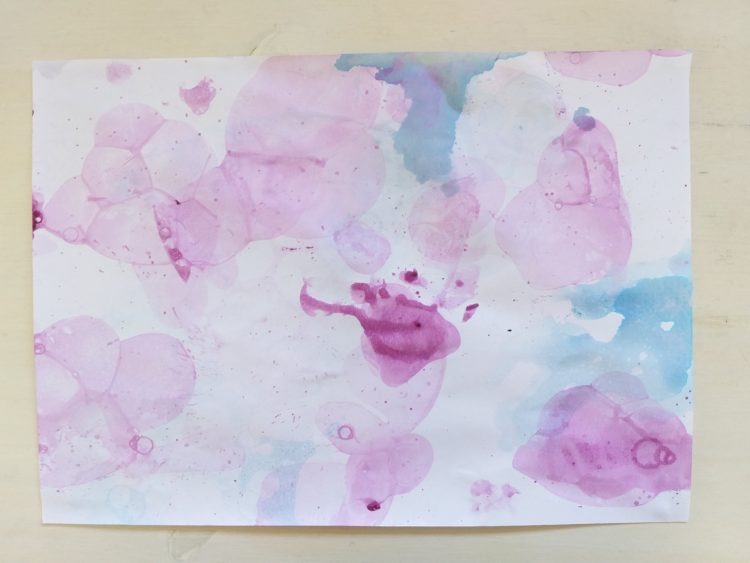
9. Drawing an Object
There is one way you can teach your children to draw and that is to look at detail. Instead of telling your children to draw a house with a square and a triangle on top, sit on the grass and really draw your house by looking at it, describing the shapes and colours.
You may want to start with a smaller object, such as a plant.
I have seen 4-year-old children draw the most amazing pictures when encouraged to draw what they see and look carefully at the object. All they need is paper, a lead pencil and an eraser.
10. Nature Collage
Making a nature collage is fun because you get to go on a walk in the park or garden and collect all kinds of natural collage materials – leaves, twigs, grass, flowers, etc.
All your kids need is some glue and paper to create an awesome nature collage.

11. Sponge Printing
Use old bath sponges for this activity. Either keep their shapes as they are or cut them into different shapes.
Dip them in paint, or watercolours, and print onto paper.
12. Free Drawing or Painting
Free drawing is an important activity that children should have time for every day. As long as your children have paper and a variety of drawing tools – pencils, wax crayons, markers, chalk – they can be given complete freedom when drawing.
With time, the scribbles turn into recognizable shapes and images and later into intricate pictures filled with details. Drawing is the most fundamental art activity and the starting point of creativity.
Children need lots of time to draw freely in order to progress through the stages of drawing.
The same applies to painting, which is a great art activity that kids should be exposed to often. Allow kids lots of time to paint freely with different sized brushes and different types of paint.

13. Drawing Portraits
Sit opposite your child, or get children to sit opposite each other in pairs, and sketch each other’s portraits with just a pencil.
Have a discussion before beginning about the features on your face, the colour and shape of your eyes, the length of your hair, etc.
14. Rock Painting
Find some well-sized rocks and paint them with thin paintbrushes. The thinner the brush, the more detail can be painted on.
Younger children can use a thicker paintbrush if they want to cover the entire rock. Older children could paint the rock one colour, then add details with a smaller brush once it dries.
Keep these as paperweights.
When it comes to painting, the ideas are endless. You could even try painting with balls.
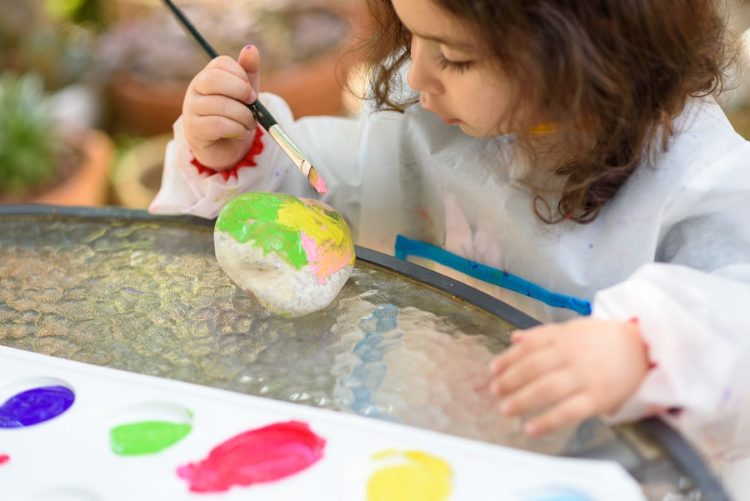
15. Cutting and Sticking
With so many ready-made craft ideas available, children seldom spend enough time simply cutting and sticking freely. These are two important skills that need regular practice.
Let your kids create freely with scissors, glue and different types of paper – tissue paper, cardboard, newspaper, regular coloured paper, etc.
And there you have it—a collection of simple yet educational preschool art activities.
15 of the All-Time Best Art Activities for Preschoolers
Notes
Looking for easy art activities for preschoolers to do at home or at school?
The best way to get young children learning while doing art is to let them experiment with art materials and tools freely.
A search for ‘art activities for preschoolers’ on Pinterest or Google will yield thousands of gorgeous-looking, fancy arts and crafts projects.
This is not that kind of article. These ideas are simple, everyday, real art activities—the kind your kids will truly learn from and the kind that don’t always look fancy.
Why Is Creative Art Important For Preschoolers?
Art is beneficial for children's development in many ways:
- It builds fine motor skills.
- It develops pencil grip and pre-writing skills.
- It teaches children how to plan on paper.
- Art develops visual perception.
- It helps children to express ideas and concepts.
- The process of doing creative art strengthens attention spans.
- Art often involves problem solving.
15 Creative Art Activities For Preschoolers
Here are some really basic and easy creative art ideas you can do at home or school with little prep. Some are completely child-led and some require a little guidance, but all are open-ended activities that encourage creativity.
1. Straw Painting
Splatter paint by flicking it from a straw or blow through the straw to spread drops of paint across the paper. The effect is unique every time.
2. Finger Painting
Use store-bought or homemade finger paints. Offer large paper and let kids explore freely with their hands for a great sensory and fine motor experience.
3. Colour Collage
Give children magazines and ask them to cut or tear pieces of paper in one chosen colour. They then glue these onto a page to create a colour-themed collage.
4. Leaf Printing
Collect leaves of different shapes. Paint one side, press it onto paper, and reveal the pattern. Discuss the lines and veins on each leaf.
5. Potato Printing
Cut potatoes in half and carve simple shapes into them, or use them as they are. Dip into paint and print patterns on paper.
6. Box Construction
Provide empty boxes, tubes, and scraps along with scissors, tape, and glue. Let kids design and build freely, creating their own imaginative constructions.
7. Shape Picture
Cut coloured paper into shapes. Children use the shapes to create pictures, adding extra details with crayons.
8. Bubble Picture
Mix water, dishwashing liquid, and food colouring or paint. Blow bubbles with a straw and press paper onto the bubbles to capture colourful patterns.
9. Drawing an Object
Encourage kids to draw by observation. Start with a simple object, like a plant, and look carefully at its details while drawing with pencil and paper.
10. Nature Collage
Collect natural items like flowers, twigs, or leaves during a walk. Stick them onto paper to create a textured nature-inspired collage.
11. Sponge Printing
Cut sponges into shapes (or leave as they are). Dip into paint and stamp onto paper to make patterns.
12. Free Drawing or Painting
Provide time each day for free drawing or painting. Give children pencils, crayons, markers, chalk, and brushes to explore and create freely.
13. Drawing Portraits
Sit opposite each other and sketch portraits. Talk about facial features, eye colour, hair length, and other details before drawing.
14. Rock Painting
Paint rocks with brushes. Younger kids can cover them in bold colours, while older kids can add detailed designs once the base dries.
15. Cutting and Sticking
Offer a range of paper types (coloured paper, tissue, cardboard, newspaper) and let kids freely cut and stick pieces to create their own designs.
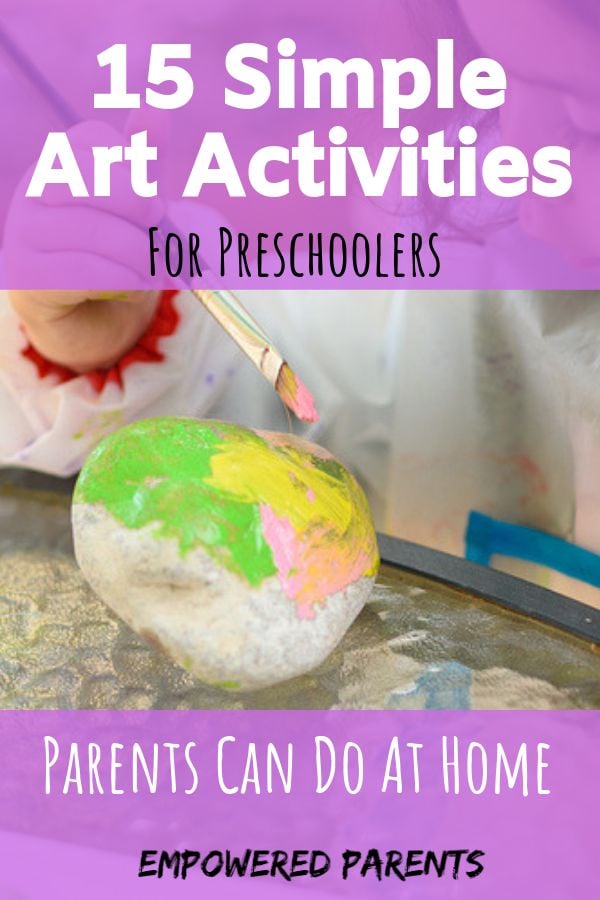
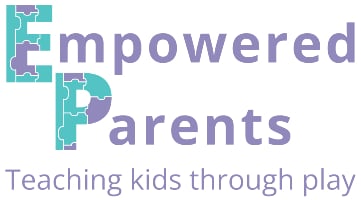
Laura
Tuesday 5th of September 2023
I just love to work with this program. Use it in my class at school I really need more ideas.
Tanja Mcilroy
Wednesday 6th of September 2023
Thanks for your comment, Laura!
Natasha
Thursday 15th of December 2022
So useful! I tried some of these with my 5 year old. He enjoyed doing them so much. it was a great way for us to spend time and just enjoy. Rock painting was his favourite.
Tanja Mcilroy
Thursday 15th of December 2022
So wonderful to hear this!
Elisabeth Den Boer
Wednesday 16th of February 2022
Really nice, thank you. When I want to do an art activity, I often just don't remember any simple art activities. Automatically I search online, but most of the time I feel frustrated afterwards, because the kids aren't able to do those. I have to do all the work. So going back to really simple activities, is so helpful. I'm going to try out some of these activities this week! Thank you so much!
Tanja Mcilroy
Wednesday 16th of February 2022
Yes, you're right Elisabeth - you land up doing most of the work yourself which defeats the object. Here are some more ideas for you: https://empoweredparents.co/benefits-of-painting-for-children/ https://empoweredparents.co/things-to-do-with-chalk/ https://empoweredparents.co/finger-painting-ideas-for-kids/ https://empoweredparents.co/preschool-cutting-activities/ There are lots more on the website and all of them are simple ideas. Take care! Tanja
Mildred Rivera
Monday 11th of May 2020
Great activities
Tanja Mcilroy
Monday 11th of May 2020
Thanks Mildred!